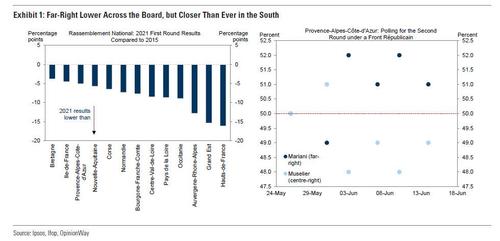French President Emmanuel Macron and far-right leader Marine Le Pen both suffered setbacks as their parties performed poorly in regional elections that saw a historically low turnout rate with more than two out of three note cast a vote.
Macron’s La République En Marche won a paltry 10.9% of votes while the far-right National Rally, led by Le Pen, won 19.1% – both lower than expected – according to exit polls. The right-wing party Les Republicains fared better and won 29.3% of the vote. An unprecedentedly high rate, 68%, of the population didn’t vote. This is the highest abstention rate under the Fifth Republic.
As Goldman economist notes Sven Jari Stehn writes, in line with expectations President Macron’s party posted another round of very disappointing results, often barely reaching the second round. The week until the second round on June 27 will now see parties negotiate to form the Front Républicain in an effort to block the far-right from reaching office. Polling suggests that this will be enough to defeat Le Pen’s party everywhere but in the Southern region of Provence-Alpes-Cote-d’Azur, although her weak first round results will likely weigh on her momentum. Xavier Bertrand—who is trailing behind President Macron in polls for the presidential elections—looks set to win re-election in the Northern region of the Hauts-de-France with a comfortable margin, thus likely providing momentum to his presidential bid.
Key Highlights via Goldman:
According to preliminary results, incumbent parties and the far-right were in the lead after the regional elections’ first round. In the widely-watched race in the Southern region of Provence-Alpes-Cote-d’Azur, far-right candidate Mariani was leading against the alliance between the centre-right and Macron’s presidential party by 2.5%. In the Northern region of the Hauts-de-France, 2022 presidential hopeful Xavier Bertrand (independent) won 42.1% of the vote, setting a 17.6% lead on far-right contender Sébastien Chenu. In other regions, incumbent parties – the center-right party Les Républicains and the Socialist party – looked broadly set for re-election.
The voting method — two rounds, proportional with lists and majority bonus — requires parties’ lists to gather 10% of the votes in order to qualify to the second round (with lists having won between 5% and 10% of votes can merge with the qualified lists). Successful lists then contend for a simple majority in the second round, where the first list benefits from a 25% seat bonus in the regional council. This system allows for the so-called Front Républicain to operate, whereby mainstream parties either support or drop-out of the race to block the far-right from reaching office. The Southern region of Provence-Alpes-Cote-d’Azur is the only region where polls give the far-right within polling error of beating a range of potential Front Républicains. Another key parameter of the second round will be voter turnout, which reached a record low at 33.9% in this first round. Although covid and reopening likely weighed on the participation rate this particular weekend, the downward trend of the past decades could also be reflected in the second round through a weakened Front Républicain.
It is difficult to map these results into the race for the 2022 presidential elections. In that respect, the presidential party’s disappointing results can be traced back to his party’s lack of local rooting. Meanwhile, the far-right’s performance looks especially mixed, as Le Pen’s party both got closer to office than ever in the South, but lost ground almost uniformally in other regions.
As a result, Goldman concludes that the center-right – Les Républicains, currently third in polls for 2022 – looks to emerge as the winner of these elections, with three of its leaders winning large victories.
The race to the 2022 presidential election could thus slightly narrow once the dust settles on this regional ballot.




